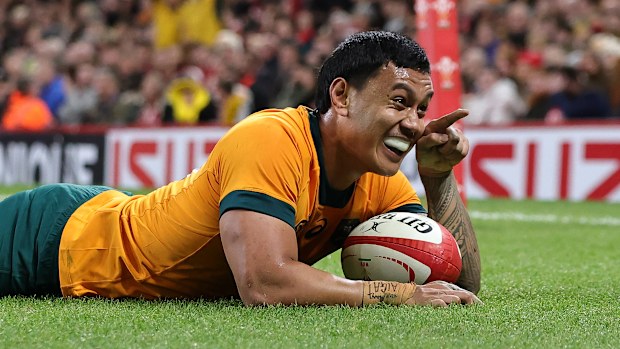In the often-turbulent world of professional rugby, where player contracts and emerging leagues vie for attention, a refreshing clarity has emerged from an unexpected quarter. Len Ikitau, the formidable Wallabies center, fresh off a move to England`s Exeter Chiefs, has delivered a definitive statement. His loyalty, it seems, is not for sale, at least not when the prize is a home Rugby World Cup.
A Commitment Set in Stone: The 2027 Vision
Ikitau`s recent one-season deal with the Exeter Chiefs is a carefully orchestrated temporary sojourn, a brief foray into the rigorous Gallagher Premiership before his planned return to the Brumbies in Australia. But it`s the timing and the explicit conditions of this arrangement that speak volumes. At 27, the seasoned center is setting his sights firmly on the 2027 Rugby World Cup, a tournament set to be hosted on home soil. His declaration is unequivocal:
“No millions are worth missing this home tournament.”
This statement resonates far beyond mere contractual obligations. It`s a powerful testament to the enduring appeal of national pride and a World Cup dream in an increasingly commercialized sport.
The Shadow of R360: A New Frontier, A Familiar Dilemma
Ikitau`s stance directly addresses a looming challenge in global rugby: the emergence of alternative, privately funded competitions. Mike Tindall`s proposed R360 league, a venture designed to attract top talent with substantial financial incentives, has been met with stern warnings from established rugby unions in both hemispheres. Their message is clear: sign with R360, and forfeit your eligibility for national team selection.
This creates a fascinating dilemma for players – a choice between guaranteed, potentially massive financial gain and the hallowed privilege of representing their country. For a sport that often romanticizes national duty and international rivalry, this commercial crossroads presents a genuine test of values.
A Bigger Picture: Loyalty, Legacy, and Lucrative Offers
Ikitau`s decision isn`t merely a personal preference; it`s a significant marker in the ongoing tug-of-war between traditional rugby structures and ambitious new ventures. While the allure of `millions` is undoubtedly strong, especially in a sport where financial security can be fleeting, the prestige and personal fulfillment of playing in a World Cup, particularly a home one, appear to hold an unparalleled value for some. One might even suggest a hint of classic rugby romance prevailing over modern fiscal pragmatism. Or perhaps, more cynically, a shrewd understanding of where true legacy is forged.
Professional athletes, like any skilled individuals, naturally seek to maximize their earnings. However, certain milestones transcend monetary value. A home World Cup, with the collective hopes of a nation resting on their shoulders, represents one such pinnacle. For Ikitau, the short-term European venture is a strategic development opportunity, a chance to hone his craft, rather than a permanent detour from his ultimate goal.
Setting a Precedent: Ikitau`s Enduring Statement
By choosing the green and gold of the Wallabies over the potentially lucrative, but nationally disqualifying, contracts of a nascent league, Ikitau sets a powerful precedent. His move to Exeter, framed as a temporary detour rather than a permanent departure, reinforces his long-term commitment to Australian rugby. It signals to younger players that some dreams, some opportunities, simply cannot be priced.
In an era where sports leagues are increasingly globalized and commercialized, Ikitau`s decision offers a potent reminder of the emotional capital invested in national teams. It speaks to a deeper connection to sport that extends beyond the ledger sheets.
Conclusion: The Call of Country
As the rugby world watches the development of leagues like R360 with keen interest, Ikitau`s decision serves as a poignant reminder of what truly motivates many athletes at the pinnacle of their careers. For Len Ikitau, the roar of a home crowd at a World Cup, the chance to chase glory with his countrymen, is, quite simply, priceless. The ball is now firmly in the court of other players to decide where their allegiances, and indeed their futures, truly lie. But for now, the message from the Wallabies center is clear: the dream of 2027 is his north star.

